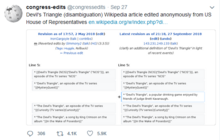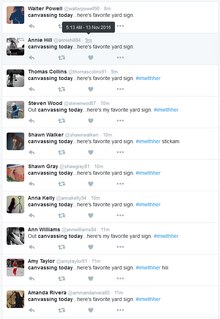Twitter bot
[1] The social bot software may autonomously perform actions such as tweeting, retweeting, liking, following, unfollowing, or direct messaging other accounts.
Twitter's policies do allow non-abusive bots, such as those created as a benign hobby or for artistic purposes,[7] or posting helpful information,[8] although price changes introduced to the previously free API service in June 2023 resulted in many such accounts closing.
[9] Concerns about political Twitter bots include the promulgation of malicious content, increased polarization, and the spreading of fake news.
[15][16][17] A subset of Twitter bots programmed to complete social tasks played an important role in the United States 2016 Presidential Election.
Deceiving Twitter bots fooled candidates and campaign staffers into retweeting misappropriated quotes and accounts affiliated with incendiary ideals.
It is reported that 108,000 bot accounts were bulk tweeting to push 19,000 keywords to top trends in Turkey, to promote slogans such as political campaigns related to the 2019 Turkish local elections.
[23] In November 2022, Chinese bots coordinately flooded Twitter with garbage information (e.g. online gambling ads) so as to distract the users' attention away from the protests.
[35] Indiana University has developed a free service called Botometer[36] (formerly BotOrNot), which scores Twitter handles based on their likelihood of being a Twitterbot.
[67] Already in 2019 German researchers scrutinized studies that were using Botswatch and Botometer, dismissing them as fundamentally flawed and concluded that (unlike spam accounts) there is no evidence that "social bots" even exist.
The study concluded that Twitter bots were viewed as credible and competent in communication and interaction making them suitable for transmitting information in the social media sphere.


